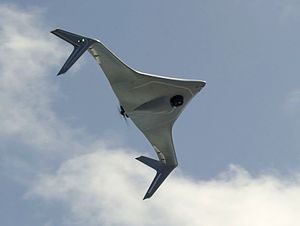| Bat | |
|---|---|
 | |
| General information | |
| Type | Reconnaissance UAV |
| National origin | United States |
| Manufacturer | Northrop Grumman |
| Designer | Swift Engineering |
| History | |
| First flight | 14 March 2006 |
The Northrop Grumman Bat is a medium-altitude unmanned air vehicle originally developed for use by the United States Armed Forces. Designed primarily as an intelligence "ISR" gathering tool, the Bat features 30 lb (14 kg) payload capacity and a 10 ft (3.0 m) wing span.
Northrop Grumman received design and marketing rights from Swift Engineering to the Killer Bee, renamed the Bat in April 2009.
The Bat UAS was redeveloped to increase payload carrying capacity and extend range. The latest variant has a wing span of 14 feet (4.3 m) and can carry up to 100 pounds (45 kg) of payload. The Bat "14" UAS has a maximum altitude of 17,000 feet (5.2 km) above sea level and a maximum endurance of 18 hours.
On August 12, 2011, Northrop Grumman won a $26m contract for Sand Dragon B Tier II UAVs able to detect IEDs and roadside bombs.
Characteristics
- The Bat UAS System is packaged for transport into two major assemblies: Launch/Recovery and Air Vehicle/GCS.
- Transportable on MV-22, HUMVEE, C-130 and by helicopter
- Bat UAVs incorporate COTS payloads for reduced costs and ease of maintenance.
- Automatic Recovery is programmed and controlled via autonomous computer and differential GPS using a portable net system.
- Catapult launcher functions are controlled and monitored by GCS software.
The blended wings merge with the fuselage into a single airfoil to reduce aerodynamic drag, improve fuel economy and increase flight endurance. Made largely of composites, including epoxy/carbon fiber and fiberglass, the airfoil is rigid, providing a structural efficiency which reduces materials and manufacturing costs. With net hooks in the nose and a rear pusher propeller, the craft lands in a mobile retrieval net.
The current Hirth engine with its five-bladed propeller provides a flight time of up to 18 hours. The Bat is designed to have a lower than average visual and radar cross-section profile. A heavy-fuel engine version is also available.
The payload capabilities include still image and real-time video cameras, EO/IR and SAR sensors, Kestrel MTI, laser range finders, laser designators, infrared cameras, communication relays, IED detection, radar jamming EW, chemical and biological detection systems, psy ops, and flare dispensers.
Uses
The Bat UAS can carry numerous types of payloads for collecting intelligence, including still image and real time video cameras, EO/IR and SAR sensors, laser range finders, laser designators, Infra-Red cameras, communications relay equipment, chemical, biological, and IED detection systems and flare dispensers. The Bat series is offered for surveillance of civil disturbances, borders, pipe- and power-lines, as well as meteorology.
Specifications (Bat UAS)
Data from
General characteristics
- Crew: None
- Length: 12 ft (3.7 m)
- Wingspan: 14 ft (4.3 m)
- Gross weight: 350 lb (159 kg)
- Payload: 75 lb (34 kg)
Performance
- Maximum speed: 104 mph (167 km/h, 90 kn)
- Endurance: 18 hours
- Service ceiling: 17,000 ft (5,200 m)
See also
References
- "Northrop Grumman Announces Bat(tm) Line of Small Unmanned Aerial Systems". Northrop Grumman Newsroom. Retrieved 2023-03-04.
- ^ Defense Review retrieved on August 15, 2014
- Defense Industry Daily Defense Industry Daily staff retrieved on August 14, 2014
- ^ Airforce Technology "Bat Unmanned Aerial Vehicle (UAV), United States of America" retrieved on August 15, 2014
- Defense Review "Northrop Grumman Bat 12 UAS (Unmanned Aircraft System): Catapult-Launched Tactical Low-Observable/Stealth Drone Aircraft with Blended Wing-Body for Electronic Warfare (EW)/Attack Ops (Video!)" retrieved on August 15, 2014
- Black, Sara (5 January 2007), "Blended Wing UAV", Composites World, archived from the original on 5 September 2008
- "KillerBee UAV". Archived from the original on 23 October 2006. retrieved on March 17, 2007
- "Bat UAS™" (PDF). Archived from the original (PDF) on 2017-06-26. Retrieved 2018-03-13.
External links
![]() Media related to Northrop Grumman Bat at Wikimedia Commons
Media related to Northrop Grumman Bat at Wikimedia Commons